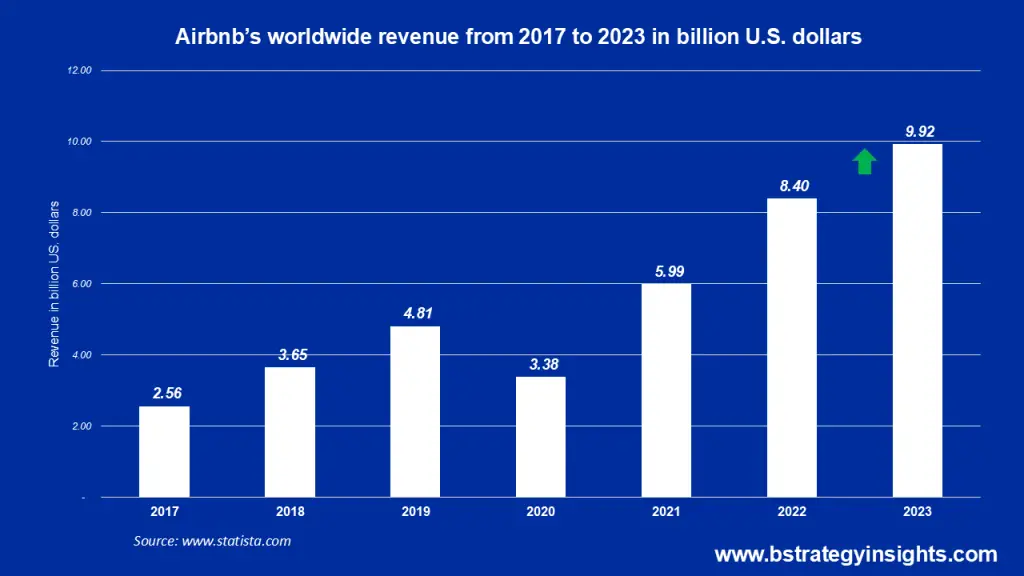
Airbnb is an online platform that connects hosts who want to rent out their rooms with guests or travelers who are looking for accommodation and rooms in a particular locality.
In this article, we cover the SWOT analysis of Airbnb Inc. consisting of strengths, weaknesses, opportunities, and threats. So let’s get started!

Airbnb – At a Glance
| Name | Airbnb, Inc. |
| Website | https://www.airbnb.com/ |
| Founders | Brian Chesky, Joe Gebbia, Nathan Blecharczyk |
| Chief Executive Officer (C.E.O.) | Brian Chesky |
| Headquarters | San Francisco, California |
| Type of Corporation | Public |
| Year Founded | August, 2008 |
| Revenues (2023) | $9.92 Billion |
| Key Products/Services | Accommodation |
| Key Competitors | Vrbo, Plum Guide, TurnKey, FlipKey |
Below is the quick facts and statistics about Airbnb based on the shareholder letter released for its Quarter 4 of 2024 results:
Key Financial Measures:
- Revenue: 3.7 billion U.S. dollars; represents10% increase year on year
- Net income: 1.4 billion U.S. dollars; represents 37% net income margin
- Adjusted EBITDA: 2.0 billion U.S. dollars; represents 7% increase year on year and 52% adjusted EBITDA margin
- Free Cash Flow (“FCF”): 1.1 billion U.S. dollars; represents 29% Q3 FCF margin
Key Business Metrics:
- Gross Booking Value (“GBV”): 20 billion U.S. dollars; represents 10% increase year on year
- Night and Experienced Booked: 122.8 millions U.S. dollars; represents 8% increase year on year
In addition to the above key financial and non-financial indicators, please also see the trend of Airbnb’s worldwide revenue from 2017 to 2023 as per the chart below:

Based on the above key financial measures and its key business metrics as well as the additional information on the trend of Airbnb’s worldwide revenue from 2017 to 2023, it can be seen that Airbnb’s performance; both financial and non financial indicators, remains in a strong position. I
Airbnb’s Strengths
Global Recognition
One of the key strategic advantages of Airbnb is that the company has global recognition. its popularity stands tall among other travel brands. Airbnb directly attracts customers to its site; in 2020, more than 90% of the traffic to the Airbnb site was direct, unpaid, or organic in nature.
Wide Selection
Through the Airbnb platform, different hosts within a given locality list their properties online so that travelers and guests have the pleasure of selecting their accommodation from a wide range of listed accommodations. This model offers travelers more options compared to hotels.
An Interactive Guest Community
Airbnb’s guest community is one of the greatest assets for the company. Airbnb’s interaction with guests and their touch of hosts makes guests comfortable to interact with Airbnb. It is this guest who has a great experience with Airbnb that returns to book directly with Airbnb as opposed to using intermediaries. The guest community is critical because it drives the company’s network growth through word of mouth. This drives traffic to the company and saves the company a lot in advertisements and marketing. Statistics indicate 69% of the company’s revenues in 2019 were from repeat customers.
Worldwide Network
Airbnb allows its network of hosts and guests for short-term rental services to expand globally without having to deploy its operations in the local areas where its guests are hosted. The guests and hosts are present in over 220 countries globally. This enhances Airbnb cross-border traveling and hosting and thus the company does not have to directly deal with the different cultures, legislation, and other cross-border intricacies. As the network grows, Airbnb gains more strategically as its network is its backbone structure.
Customized Platform
Airbnb has invested a lot in its platform and has ensured that it has the latest state-of-the-art features for guests and hosts. These leading industry features include pricing recommendations, integrated payments, scheduling, host protection mechanisms, feedback, reviews, and community support among others. The company uses AI and Automation to enhance safety features for both the hosts and guests. Its payment capabilities have a worldwide reach so that individuals can join the network. The platform has been translated to more than 60 languages to ensure that services are localized for guests and hosts.
Huge Hosting Community
Airbnb has a global host network of more than 4 million hosts that have joined Airbnb organically or through incentive schemes where hosts recruit other hosts. More often, guests turn into hosts after having a positive experience with Airbnb. 2019 statistics reveal that 23% of the hosts were first of all guests before they turned to be hosts.
Leadership Position
Airbnb has the benefit of being the first market entrant and therefore a leader in its service category. And even when there are other imitators of Airbnb, the company has strategic benefits of being an early entrant, this makes it stands out against competition due to its dominance in the market.
Provides a Cheaper Option
Airbnb provides a cheaper option to guests, especially when compared to the cost of reserving a room in the hotel. Airbnb’s model aims at undercutting the overhead costs that usually drive costs higher for the hotel industry. Hotels often have to deal with overhead costs like staff salaries, room supplies and materials, room maintenance, and even opportunity costs incurred particularly when the rooms are empty.
Airbnb’s Weaknesses
Litigations
Airbnb has often had to face lawsuits arising from it allowing strangers to hosting, a move that in some jurisdictions is against housing laws and regulations. Airbnb pays the host for their rented spaces. Given this is hustle-free, many people consider it as easy income and would therefore rent out their rooms without taking time to consider whether they are legally allowed to do so. The end result is that Airbnb ends up with lawsuits which can be costly.
Low Profitability
Airbnb has for a number of years now been experiencing losses. It had a net loss of $70 million, $16,9 million, $674.3 million, and 696.9 million for 2017, 2018, 2019, and the nine months ending 2020. It equally had an accumulated deficit of $1.4 billion and $2.1 billion for 2019 and nine months into the 2020 financial year. This threatens the company’s profitability. This would call for more effort on the part of the company for it would raise revenues to significantly cover its expenses.
Slow Growth in Revenues
There are some regions of Airbnb that have lower fees. Additionally, with the growth of the company, it may choose to lower its fees to attain competitiveness in the industry. This would negatively impact the company’s efforts to improve its profitability.
Airbnb’s losses and low revenues may go on for some time. And with the advent of COVID 19, the company’s revenues continued to decline.
Failure to Maintain Quality Standards
While Airbnb gives guidelines to its hosts on how to host, it largely relies on the hosts for the implementation of its quality standards. The levels of cleanliness, pricing, and comfort vary across the various hosts. The hotels at least have uniform standards across all their hotel destinations. This leads to a lack of uniformity in the company’s delivery of services and denies the company direct control over desired quality standards. Additionally, poor hosts could easily ruin the company’s reputation.
Lack of Homogenous Marketing Plan
Airbnb’s model is that of crowdsourcing and therefore the company lacks a cohesive marketing strategy. It largely depends on clustered hosts if it were to do marketing and additionally appeals to hosts and guests in equal measure for word of mouth marketing. This may not have a larger impact.
Airbnb’s Opportunities
Expansion of the Company’s Services
Airbnb’s current business model mainly focuses on accommodation. The company could consider expanding their service offering to include car rental, tickets for attractions with the vicinity among others.
More Global Expansion
Airbnb still has a lot of ground to cover globally in its expansion. There are particularly emerging markets that would offer opportunities for growth for the company. And even in markets where the company has penetrated, there could be sub-niches that the company would need to explore with more depth.
More Leveraging on Technology
Technology offers more power of leverage to ensure better quality, increased responsiveness, and market penetration among other benefits. There is a need to increase Airbnb’s power of its mobile app so that guests are able to make reservations even on the move and also to ensure a seamless experience.
Airbnb’s Threats
Grey Areas of Housing Regulations and Laws
There prevails uncertainty as regards the current and future legal regulations in the housing sector. State governments and local governments have kept shifting positions with regard to the legality of private property owners renting out their spaces. This gives room for more litigation on the part of Airbnb.
Stiff Competition
Airbnb has visible and direct competitors like Vrbo, Plum Guide, TurnKey, FlipKey who have the same business model as Airbnb, they offer unique accommodation spaces to guests. The company also faces indirect competition from sites like Hotels.com and Booking.com who provide information on hotels with much cheaper rates. These competitions could threaten Airbnb’s market share as well as returns.
Inherent Risks
while Airbnb has continued to tighten its guidelines on the safety of its guests as well as the hosts, the company remains under constant fear of its guests being harmed. Apart from violent attacks, there are concerns about hosting properties that lack smoke detectors, fire extinguishers, carbon monoxide detectors, and first aid kits among others.
Conclusion
Airbnb championed a novel idea in the accommodation industry that has earned it a global leadership position in its niche. The company however needs to focus on eliminating the weaknesses like poor standards among hosts and safety issues for their guests and hosts. Additionally, the company needs to maximize the global market reach for expansion.
Reference
- Shareholder letter for Q3 of financial year 2024 from investors.airbnb.com
- Airbnb’s worldwide revenue from 2017 to 2023 from www.statista.com.


